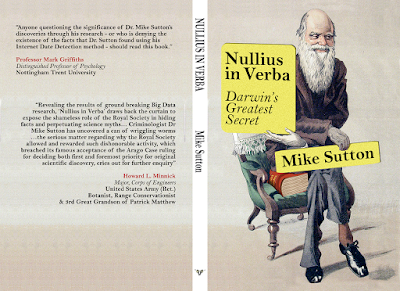Mike Sutton
Dr Mike Sutton is the author of 'Nullius in Verba: Darwin's greatest secret'.
Updated 2018
Original post ARCHIVED http://archive.is/o2i2R
The Shocking 1656 Etymology of Easter Eggs?
Apr. 3, 2015 7:14 pm
Categories: None
Was an act of chucking rotten eggs at a crucified priest in Scotland the cultural origin of the term Easter eggs?
Using the Internet Date Detection (IDD) method we can find that out of the 30+ Million Books in Google's Library Project, it seems that the earliest use of the term 'Easter egg' or 'Easter eggs' in English occurred in print in 1656.
The circumstances described are shocking.
Were rotten eggs thrown at a priest the first to be described as Easter eggs in the English language? Surely not. But, until dis-confirming evidence rolls around the corner, this is a distinct possibility.
At a time, described as 'near Easter' in April 1565, it is reported that bailiffs imprisoned a priest after giving mass and then:
"Priest-like, mounted him on the Market Cross, with his Chalice bound to his hand, and his body to the cross, for 2 hours, whilst the boys sweetened him with rotten Easter Eggs.'
Bonnie Taylor Blake searched in other archives and on the archaic spelling "Easter egges" she got back further than I could with that term. Bonnie got a reference as far back as 1572 : . Knox, J. (1572) History of the Reformation:
"Himself fast tyed to the said crosse, where he tarried the space of one hour,during which time the boyes served him with his Easter egges."
Now here is something.
In both Bonnie's earlier example for "Easter egges", and my later one of "Easter eggs" a man is tied to a cross for a specific period of time. Both accounts - mine published in 1656 and Bonnie's find, published in 1572, tell the exact same story about the same priest who was pelted with rotten eggs in Edinburgh, whilst tied to a cross on the same day in 1565.
Clearly far more research is needed. But the cultural history, in Britain at least, of the Easter egg might just be more sinister than previously known.
The Rotten Easter Eggs Hypothesis
In 16th Century Britain, it seems quite possible that the Easter egg arrived on these shores pre-named, or else was "christened", on independent invention or re-generation, with the sole sinister purpose as ammunition to throw at Catholic priests tied to crosses in public punishment spectacles in Scotland.
To disprove this tentative hypothesis, I invite researchers to find a pre-1565 example of Easter eggs being consumed in Britain, collected, rolled down hills, offered in churches, given to children, painted, or whatever else, rather than simply thrown a priests.
If you can discover an earlier English language use than 1656 - of the term Easter eggs (or Easter egg ) and earlier than 1572 for "Easter egges" or Easter egge" please leave a comment below - with a reference to the source.
Author's note: With the invention of the Internet, Google Chrome and its library of over 30 million books and other publications, we are today able to search for the apparent first published use of particular words, terms and phrases. As more publications are scanned we may find earlier usages that disprove our first conclusions. But that is how knowledge has always progressed. The possibility of one day discovering a human skeleton in the fossil record below that of a dinosaur does not disprove the theory of natural selection; quite the opposite. The ability to completely disprove such a theory in one fell stroke, with one piece of dis-confirmatory evidence, is exactly what makes it such a powerfully important theory.
If you are interested in how Google's huge online library is facilitating new discoveries about the world and people in it, you could do worse that read 'Nullius in Verba: Darwin's greatest secret' to discover how the IDD research method overturned the history of discovery of macroevolution by natural selection:
If you are interested in how Google's huge online library is facilitating new discoveries about the world and people in it, you could do worse that read 'Nullius in Verba: Darwin's greatest secret' to discover how the IDD research method overturned the history of discovery of macroevolution by natural selection:




No comments:
Post a Comment